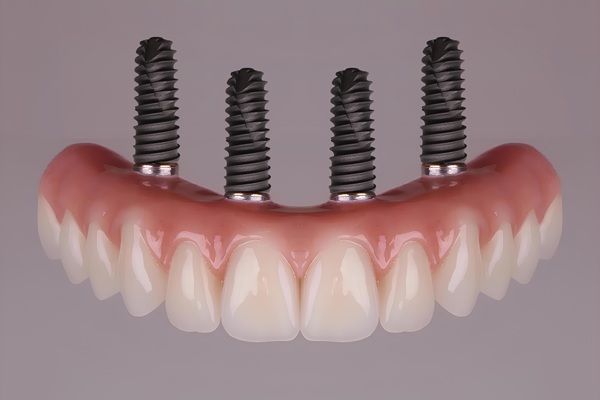How Dental Implants Improve Your Jawbone

dental implants are the preferred option for replacing lost teeth. They are the perfect option if you want a tooth restoration that has the natural appearance and function of a healthy tooth. Dental bridges and dentures are also excellent choices for restoring lost teeth, but their strength and durability are not comparable. They also help improve the jawbone, and here is why:
Osseointegration
This process, which describes the fusion of the implants with the bone, is what makes dental implants so sturdy. Implants are comprised of titanium posts, which is a biocompatible metal. Therefore, when the post is inserted into the jawbone, the metal and bone integrate. This means that the implant will get the same support that the root of the old tooth had. This is why the implant and attached dental crown have similar strength and functionality as the healthy, natural tooth.
How this affects the jawbone
When a tooth is missing, either due to trauma or infection, the appearance of the smile is not the only thing at risk. Missing teeth can interfere with chewing, speaking and smiling confidently. Also, the bone needs to be continuously stimulated to maintain its structure. Stimulation is provided by the tooth’s root from normal chewing and biting. Once the tooth falls out, the stimulation is lost, and the jawbone starts to deteriorate since the body will stop delivering calcium to that area of the body.
Once the jaw starts to shrink, it could pose a threat to the remaining teeth and could make the face sag or sunken. A significant part of bone resorption begins within a year after losing the tooth. Therefore, it is essential to replace a lost tooth or teeth with dental implants as soon as possible.
Since the dental implant sits inside the jawbone, the act of chewing while eating stimulates the bone. The stimulation provided by a dental implant is identical to that offered by a natural tooth. Therefore, dental implant halts bone resorption to preserve the jawbone and appearance. These restorations not only restore teeth functions, but they also help maintain a youthful countenance.
The implantation process
To know more about dental implants and if you are a suitable candidate, you should book an appointment with the dental office. The dentist will perform a thorough medical and oral examination and take X-rays to assess your jawbone mass. These procedures are necessary to determine your eligibility for the implants. If you qualify, you will receive an appointment for the surgery, during which the metal posts will be inserted into your jawbone.
The osseointegration procedure requires a few months, usually six, but you will be provided a temporary restoration until the bone heals fully. After osseointegration is complete, you will be ready for a dental crown.
In summary
Dental implants help prevent jawbone resorption and preserve your bone mass. This, along with their ability to give you a beautiful smile, is why they are the preferred method of restoring a lost tooth.
Request an appointment here: https://www.southfloridadentalarts.com or call South Florida Dental Arts at (305) 230-4041 for an appointment in our Miami office.
Check out what others are saying about our All-on-4 Dental Implants services on Yelp: All-on-4 Dental Implants.
Recent Posts
A dental implant is the gold standard of dental restorations. It provides stability and natural-looking results. Understanding the benefits of implants can motivate you to see your general dentist about it. Here are the different oral health advantages of a dental implant.The titanium rod acts as the dental root. It merges with the jawbone and…
Dental implants are the gold standard in teeth replacement. These restorations are durable and biocompatible. Most people prefer durable and stable dental prosthetics to removable dentures. Implants owe their security to the prosthetic root and dental crown. If you want to know how the prosthetic root and crown help dental implants become stable and strong,…
Dental implants restore missing teeth in a way that feels natural and does not interfere with eating or speaking, but the thought of dental implant surgery may at first seem a bit daunting. Knowing what to expect can ease your mind and help you prepare to go through the surgery with minimal stress. Here are…
A patient may invest in dental implants for a variety of different reasons, many of which focus on positively changing personal image and improving overall oral health. Implants are often applied when patients are missing one or more teeth and are not interested (or have had no success with) dentures or dental bridges. To understand…


